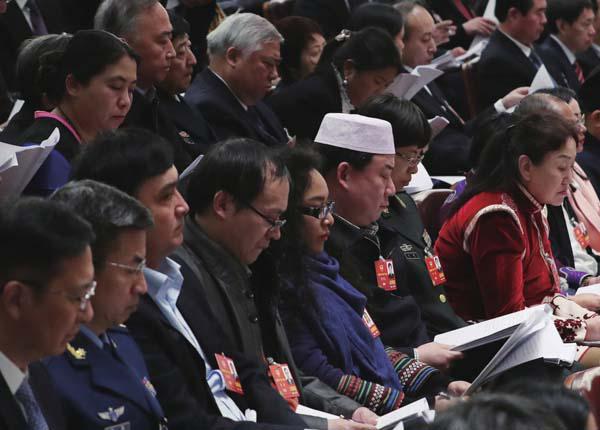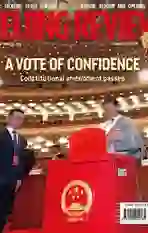A Chinese Solution
2018-12-04ByJiangWei
By Jiang Wei

On March 4, President Xi Jinping, also General Secretary of the Communist Party of China (CPC) Central Committee, attended a joint panel discussion with political advisors from the China Democratic League and the China Zhi Gong Party, those without party affiliation and those from the sector of returned overseas Chinese, who gathered in Beijing to at- tend the First Session of the 13th National Committee of the Chinese Peoples Political Consultative Conference (CPPCC), Chinas top political advisory body.
During the discussion, Xi stressed that China must consolidate and improve the system of multiparty cooperation and political consultation under the leadership of the CPC, and tap the unique potential of multiparty cooperation to provide practical advice and pool wisdom for advancing socialist democracy.
Distinctive features
After nearly 69 years of progress and reform since its founding in 1949, the Peoples Republic of China has developed a political party system unlike any other. Chinas system features multiparty cooperation and political consultation under the leadership of the CPC, in which the CPC is the ruling party and eight non-communist political parties participate in the deliberation and administration of state affairs. This political party system is distinctly Chinese in its characteristics.
In establishing the system, China has avoided using other countries political party systems as a criterion to restrict its own development, instead designing one specifi -cally suited to its own national conditions.
With the leadership of the CPC as a precondition, the system aims to achieve unity and mutually advantageous cooperation. Chinas various political parties are not in competition or opposition to one another. The CPC has established amicable relations with the non-communist parties over their long years of cooperation. Chinas new type of political party system avoids the defects which arise from a lack of democratic supervision under one-party rule, as well as the political upheaval caused by power rotation and destructive competition among multiple parties. The CPC, the non-communist parties and those without party affi liation have formed a harmonious and democratic political ecosystem through effective cooperation and interaction.
The system has absorbed the functional aspects of a range of world civilizations, all rich in democratic values, adhering to the will of the people through a democratic decision-making mechanism. Chinas major policies and decisions are not made by any single political party, but are the result of consultation and deliberation by the CPC and non-communist parties together. They pool their wisdom to develop a blueprint for the future of the nation, uniting to properly handle state affairs.
The CPC has provided institutional guarantees for this new-type political party system. A guideline on further improving the system of multiparty cooperation and political consultation under the leadership of the CPC, published by the CPC Central Committee in 2005, said that CPC committees should regard the work of supporting other political parties in strengthening self-construction as an important political responsibility. The guideline has provided institutional and procedural conditions for non-communist parties to perform their duties, improving the democratic nature of multiparty cooperation and giving full range to democratic supervision.
Harmonious interaction
Chinas political party system perfectly combines both theory and practice. The theory of the CPC-led multiparty cooperation and political consultation system is rooted in the history of modern China, specifi cally arising after the Opium Wars in the 19th century. It was a choice made by the Chinese people in the salvation of the nation through the fusion of Marxist political party theories and Chinas actual conditions.
China, in the past, copied the political models of other countries and failed in the process. Ultimately, the system of multiparty cooperation and political consultation was chosen because of its incorporation of the theories of peoples democracy, multiparty cooperation, the united front and the mass line, representing a fusion of Eastern and Western political thought as well as the fruits of modern cultural progress. China respects the development models chosen by other countries and hopes in turn that other countries can respect the political system chosen by the Chinese people.
Multiparty cooperation and political consultation integrate a number of elements, including the leadership of the CPC, the rule of law, people being the masters of their own country, community-level democracy and civil society. The harmonious interaction of these elements has driven Chinas social progress.
In the process of developing its system of multiparty cooperation and political consultation, the CPC, non-communist parties and personages without party affi liation have achieved a great political innovation. The history and achievements of the Peoples Republic of China have proven that this new type of political party system that integrates theory and practice can authentically represent and realize the fundamental interests of the Chinese people of all ethnic groups.
The CPC-led multiparty cooperation and political consultation system respects the will of the majority while upholding the rights of the minority. Under the system, all political parties in China work together toward the common goal of building a stronger country and realizing the prosperity of the people. They understand and communicate with each other to effectively avoid competition.
Unique system
China has built a more rational and efficient decision-making mechanism. Today, there are two kinds of democracy in the world —electoral and consultative. China has highlighted the latter in decision-making, governance and supervision. Different parties work toward the national interest and peoples well-being in the process of consultation rather than striving for the interests of their own members.
China needs an effi cient decision-making mechanism as it has a huge population. Political consultation emphasizes the role of institutions and respect for procedure while avoiding the social fragmentation caused by ideological differences between political parties. Political consultation advocates dialogue and inclusiveness, and represents an important contribution to the political civilization of humanity.
The CPC-led system of multiparty cooperation and political consultation is an innovation unique to China, with its roots spanning the vast expanse of the countrys past and present. Benefiting from achievements made in the progress of human politics, it breaks the pattern of repetitive party alternation and widens mankinds vision. Chinas new type of political party system provides a distinctly Chinese solution to mankinds creation of a democratic and harmonious political and social life.
